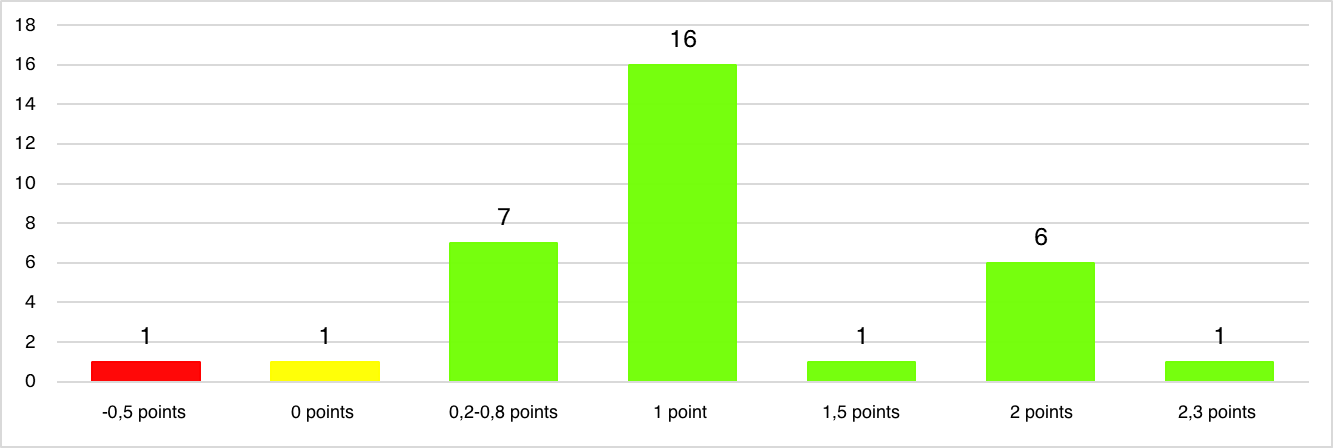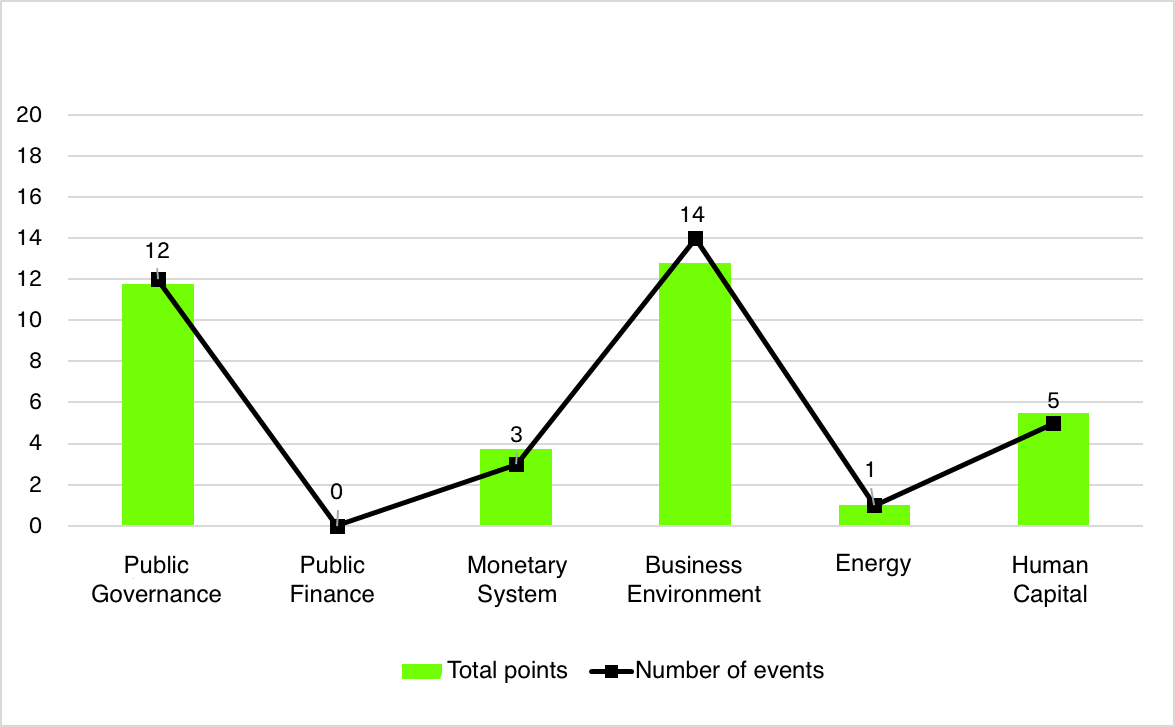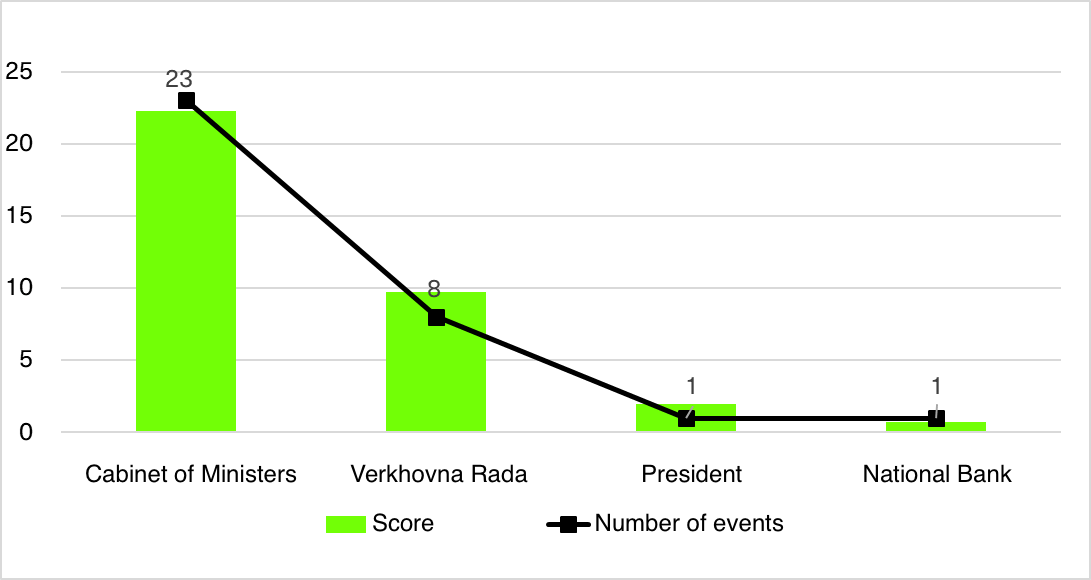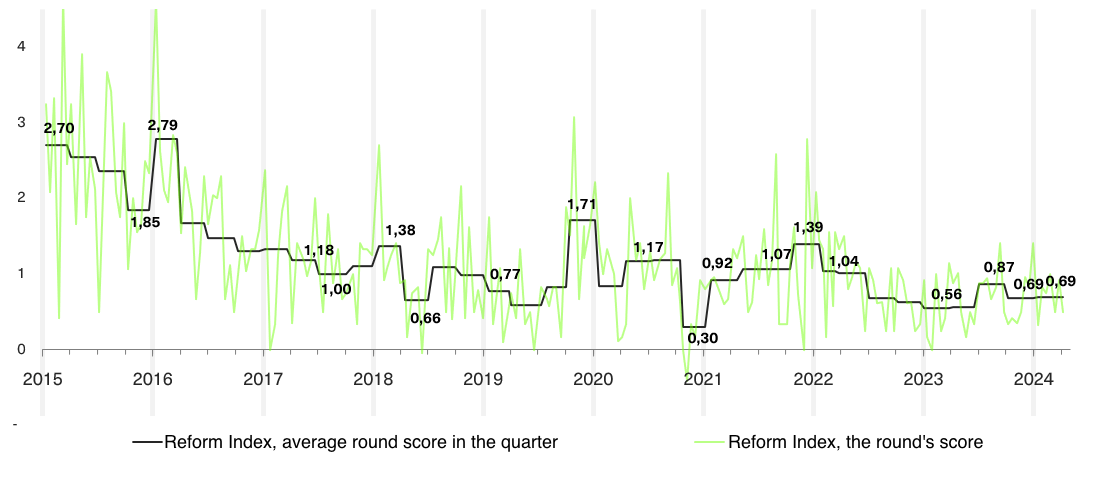Traditionally, at the beginning of the year, the number of reforms significantly decreased; however, this was partially compensated by the quality of changes.
People’s deputies and the Cabinet of Ministers initiated several crucial shifts, including the establishment of the State Register of Sanctions, the adoption of the Medical Cannabis Law, and changes to corporate governance rules in state-owned companies. Unfortunately, the Reform Index experts noted an anti-reform regulation for the first time in almost two years, with the lobbying law being an unexpected example. Even though the law is one of the requirements for the start of negotiations on Ukraine’s accession to the EU, its provisions are written in a way that creates risks of persecution of civil activists.
Key changes
From all the regulations adopted by the central authorities, the editorial board of the Reform Index selected 33 long-term changes that significantly impact the country’s life. Seven of them received a rating of +2 points or more — indicating they have significant potential for positive impact on the country.
Chart 1. Distribution of regulations by the score received in 1st quarter of 2024.
Source: Issues 229-235 of the Reform Index
All evaluations of regulatory acts by the Reform Index experts can be found at the following link.
The highest rating of +2.3 points was awarded to the resolution on the new rules for the sale of gas under production sharing agreements (where an investor funds the exploration and extraction of minerals and receives a portion of the extracted product, with the rest going to the state). It has been determined that investors will transfer the state’s share of gas to the SOE “Gas of Ukraine,” and this company will sell it on the open commodity exchange. The proceeds from the sale will be transferred to the state and local budgets (based on the extraction location). Previously, it was only broadly outlined that the state’s share of gas should be sold through exchanges/auctions.
Also, in the first quarter, Parliament passed three important sectoral laws:
- On commodity markets and capital markets (+2 points). This law increases the powers of the National Securities and Stock Market Commission (NSSMC), which has been granted the authority to investigate violations on capital markets. The new procedures for selecting the chairperson and commission members based on competition and considering their business reputation will increase market participants’ trust in the commission. Organizations operating in these markets will be required to introduce a mechanism to avoid conflicts of interest or regulate them.
- On corporate governance of state-owned companies (+2 points). This law further delineates the powers of the government and supervisory boards. High-level governance will remain under the purview of the Cabinet of Ministers: it will determine the criteria for classifying enterprises as strategic or those to be privatized, reorganized, or liquidated, and through the Ministry of Finance, it will establish profitability requirements for state-owned enterprises. In contrast, the supervisory board of the enterprise will be responsible for compliance with the established requirements and for appointing and dismissing the enterprise’s manager. A safeguard has been included in the law to prevent a situation similar to that of Naftogaz, where the supervisory board was dissolved for two days to dismiss the head of the gas supply company: in the absence of an appointed supervisory board, no one else can make decisions exclusively within its competence.
- On medical cannabis (+2 points). In Ukraine, the circulation of hemp has been permitted for medical, industrial, educational, and scientific purposes, as well as the importation of cannabis seeds, products of its partial processing (for medicine production), and plants (for scientific research). To obtain permission to cultivate hemp for medicine production, entrepreneurs must ensure traceability of each plant through round-the-clock video surveillance of plantations. Each plant, batch of raw materials, and package of medicines will be marked with a unique electronic identifier, allowing it to be tracked in the electronic accounting information system.
An important change is the establishment of the State Register of Sanctions (+2 points). It contains information about sanctions imposed by Ukraine on individuals and legal entities. The register is maintained in Ukrainian and English and is open to users.
In the spring, the National Agency on Corruption Prevention (NACP) closed its registry of “international sponsors of war” (companies cooperating with Russia) because the inclusion of companies in such a list was not prescribed by Ukrainian legislation, and some countries complained about the appearance of their resident companies on this list.
Two positive changes concern enterprises. Firstly, the government registered the trademark “Made in Ukraine” and allowed enterprises and government bodies to use it free of charge (+2 points). Secondly, the capabilities of Diia.Signature should become available to legal entities (+2 points). This means that representatives of enterprises will be able to undergo remote identification, submit electronic copies of company documents, and apply a qualified electronic signature through the mobile application. However, the service is still under development.
The Lobbying Law (-0.5 points) had all the potential to become a vital Eurointegration reform; however, due to the contentiousness of some amendments, it became the first anti-reform effort in the Index since the summer of 2022.
The law aims to increase transparency in the interaction between the state as a policy developer and stakeholders (individuals, businesses, and other states). Individuals and organizations lobbying for the adoption of regulatory acts in their commercial interests or the interests of third parties must register in the Transparency Register, which will be maintained by the NACP.
Among the key flaws of the law is its definition of lobbying solely as work aimed at adopting regulatory documents, with the development of certain policies or administrative decisions remaining outside its scope.
Another issue lies in determining what constitutes a commercial interest. Business associations point out that actions by companies, which are currently interpreted within the framework of the right to self-representation, will be classified as lobbying, requiring registration in the Register, reporting, etc. The activities of business associations in developing proposals to improve the business climate may also fall under the purview of this law. The imprecision in defining “commercial interest” may also affect NGOs. It is noted that their activities are not lobbying, “except in cases where such activities concern commercial interests.” However, it is difficult to determine how the concept of “commercial interest” relates to public initiatives and whose commercial interests may be taken into account (e.g., banning old cars with significant emissions is beneficial for the environment and health but also aligns with the commercial interests of car manufacturers and importers).
Progress by Reform Index areas
In the first quarter of 2024, reforms covered five out of six observed areas, with only state finances remaining unchanged. The energy sector also had relatively few events: only the decree on the mechanism of gas sales under production sharing agreements, described at the beginning of the article, was included in the Index. We will provide more detailed information about the three areas where reforms were most significant further on.
Graph 2. The sum of event scores by area, 1st quarter of 2024
Source: Issues 229-235 of the Reform Index. Note: The total number of events in the chart is 35 because two events (the lobbying law and the law on simplifying land use change for investment attraction) were classified under two directions simultaneously: “Public Governance” and “Business Environment.”
Business Environment
We recorded 14 significant changes in this area in the first three months. One of them is the only anti-reform effort of the quarter: the lobbying law described above. It not only falls under “Business Environment” but also under “Public Governance.” Additionally, three events from the top reforms were classified in this area: the mechanism for selling gas obtained by the state under production sharing agreements, the opportunity to use the “Made in Ukraine” trademark free of charge, and the Diia.Signature project for legal entities. Further details about other essential changes in this area follow.
In the first quarter, the government defined criteria for providing state aid in various sectors of the economy: in the service sector representing a common economic interest (+0.2 points), in civil aviation (+0.35 points), in port infrastructure (+1 point), and in sports infrastructure (0 points). They all share the characteristic that state aid should have a stimulating effect and should be provided to enterprises that are not in a difficult situation.
Several changes relate to deregulation. The government simplified the licensing of ethyl distillates and alcoholic beverages (+0.75 points). Instead of undergoing production certification and submitting this certificate to obtain licenses, producers now file a declaration of compliance with legal requirements for their material and technical base. Additionally, the government changed the rules for ammunition production (+1 point). Producers who previously obtained the right to manufacture and supply ammunition for drones automatically gained the right to produce all types of ammo. For faster recovery of industry and infrastructure, lawmakers voted for a law simplifying land use change outside settlements from agricultural to industrial purposes (+0.75 points). If the land is not reflected in approved urban planning documentation at the local level, a request for a designation change can be submitted without urban planning and surveying documentation. On the one hand, this simplifies bureaucratic procedures. However, on the other hand, it increases the risk of improper land acquisition and reduces the influence of local authorities on decisions regarding land use within communities.
The active public debate provoked changes in the regulation of casinos (+1 point). Gambling organizers are required to join the State Online Monitoring System and provide real-time information about players’ unique identifiers, bet placements and returns, winnings payouts, and other relevant data.
Taxpayers also saw positive changes (+1 point): the state abolished fines for specifying the wrong budget account of the funds’ recipient (provided that taxes are paid on time), allowing taxpayers to participate in the consideration of inspection materials and complaints via video conferencing.
Public Governance
In the first quarter, we recorded 12 significant changes in this area. The anti-reform (lobbying) law and two events from the top reforms (the provision regarding the State Register of Sanctions and the law on corporate governance of state-owned companies) were mentioned earlier.
Changes also affected the management of state property. The Cabinet of Ministers developed a procedure for transforming budgetary uniform enterprises into state limited liability companies (LLCs) (+1 point), as previously there was only a mechanism for transforming them into joint-stock companies (JSCs). Since state property in unitary enterprises is held under management rights rather than ownership, they are severely limited in making decisions regarding this property and attracting external financing (as they lack both assets and statutory capital). The organizational form of LLCs addresses these shortcomings.
The organizational form of the State Enterprise “Guaranteed Buyer” has also been changed (+1 point). It has become a joint-stock company, with 100% of its shares owned by the state and not subject to privatization. The change in form will allow the enterprise to obtain statutory capital and a more transparent management system.
The state has eased the rules for leasing state property to organizations providing social services (psychological support departments, daycare for children with disabilities, social and labor adaptation, etc.) (+0.25 points). Now, representatives from the private sector are also eligible to apply for preferential rent at a rate of 1% of the property’s value, extending beyond municipal and state institutions and NGOs. Additionally, the documentation required to apply for this benefit has been reduced to just a certificate of the organization’s inclusion in the Register of Providers and Recipients of Social Assistance.
Furthermore, the Cabinet of Ministers has updated the procedure for using water fund lands (+1.5 points). The new procedure expands the list of lands belonging to the water fund, including islands and coastal strips not occupied by forests, lands under reservoirs, and artificially created land plots in the water areas of seaports. The procedure clearly defines the list of activities that can be carried out on water fund lands, including the construction of hydro-technical and fortification structures, pipeline laying, dredging, and so on.
The reform of civil servants‘ remuneration has taken a significant step forward: the government has endorsed a pay system structured around job classifications and grades (+1 point). All existing civil service positions have been grouped into tiers (9 position levels), categories (27 position categories based on areas such as administrative leadership, managerial functions, international cooperation, etc.), and grades (15 levels of pay). The resolution establishes a salary structure according to the position level and category.
Now, rural and settlement communities will be able to independently attract credit funds (+1 point). Previously, this option was available only for regional budgets and budgets of urban territorial communities. This will increase the autonomy of local authorities and allow them to be more flexible in financial matters.
Human Capital
Over the first quarter of 2024, we’ve observed five significant changes in this area, covering the medical field and social protection.
In addition to the aforementioned law on medical cannabis, reforms in the healthcare sector included the advancement of law on providing pre-medical and medical assistance at the pre-hospital stage during combat operations according to NATO standards (+1 point) and a resolution expanding the use of telemedicine (consultation via video communication) in the provision of rehabilitation services (+1 point).
Progress in social protection was achieved by attempts to improve housing conditions for internally displaced persons. Among the priority categories for temporary housing, internally displaced families of service members and IDPs from the community providing them with housing were added. Additionally, a resolution (+1 point) addressed the issue of registering the need for housing: previously, communities without available housing stock refused to register IDPs as needing housing. Now, this cannot be a reason for refusal, and both the receiving community and the authorities of the territories from which these people departed can finance housing for IDPs. Another change in this area concerns the establishment of Resilience Centers, which are expected to appear in all communities in the future (+0.5 points). These are social spaces where psychological support will be provided to people, including psychologist consultations, support groups, and assistance with various social issues. The resolution establishes criteria for accessibility and safety: each center must have a shelter.
Who is the biggest reformer?
In the first quarter of 2024, as in the previous year, the Cabinet of Ministers remained the leading reformer: it issued 21 reform resolutions and two laws. MPs initiated eight reforms. The President and the NBU each initiated one: a decree on the State Register of Sanctions and new liquidity standards for banking groups (from 2025, the required liquidity level of a banking group to cover the net expected outflow of cash within 30 calendar days, taking into account stress scenarios, and the minimum required level of stable funding of a banking group over a one-year horizon should be 100%).
Graph 3. Reform initiators in the 1st quarter of 2024
Source: Issues 229-235 of the Reform Index
In the first quarter of 2024 compared to the previous quarter:
- The number of reforms significantly decreased from 51 to 33.
- The average round score remained at a low level of 0.7 points.
- The average event score remained unchanged at 1.1 points, within a range from -5 to +5.
Graph 4. Average quarterly value of the Reform Index
Source: Issues 229-235 of the Reform Index
For the third consecutive year, we have observed a decrease in the number of reform regulations at the beginning and an increase in the number of reforms in the second half of the year. Unfortunately, the challenges Ukraine faces do not allow for rest. Therefore, we hope the government will significantly strengthen its efforts in the second quarter, rather than waiting until the end of the year to “catch up.” Furthermore, the action plan is clear, as Ukraine has approved a list of necessary institutional and sectoral reforms together with its international partners.
Attention
The author doesn`t work for, consult to, own shares in or receive funding from any company or organization that would benefit from this article, and have no relevant affiliations







